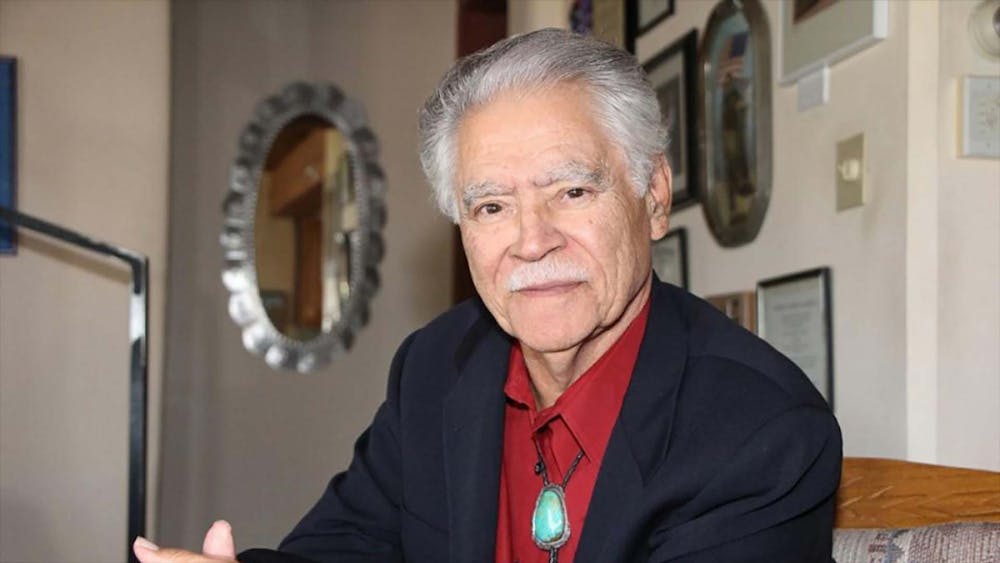Prolific writer Rudolfo Anaya has deep ties to the University of New Mexico. Known especially for his first book, “Bless Me, Ultima,” Anaya received three degrees from UNM and served as a professor emeritus in the English department before his death in 2020.
Anaya is a foundational figure in Chicana and Chicano studies, according to English department associate professor Melina Vizcaíno-Alemán.
“He really put Chicano literature on the map — and I would say even more specifically New Mexico — in the larger national literary scene,” Vizcaíno-Alemán said.
While at UNM in 1989, Anaya founded the Blue Mesa Review, a literary magazine run by graduate students in the Master of Fine Arts program, according to its website.
“As a landscape of intersectionality and diversity, the Southwest is the perfect place for beautiful intersectional art to grow, and Anaya, a creative writing instructor at the time, charged Blue Mesa Review with tending those roots in our community,” the website reads.
Anaya developed the creative writing program at UNM and donated money to establish both a scholarship for the English MFA program and a ten-year lecture series, Vizcaíno-Alemán said.
The lecture series ended with a lecture from Joy Harjo, the first Indigenous United States Poet Laureate and a former student of Anaya’s.
Myrriah Gómez — an associate professor in the Honors College — said that although Anaya was awarded both a National Medal of the Arts and a National Humanities Medal by two sitting presidents, his influence can be underestimated.
“We take for granted the immense influence of Anaya's work on American literature because he was a native New Mexican, but he is known as the padrino (godfather) of Chicano literature,” Gómez said.
Gómez teaches a 300-level course in the Honors College about Anaya.
“If we can teach Shakespeare, Milton and Chaucer, then why not also teach Anaya as a literary great?” Gómez said. “I also try not to romanticize his work. In fact, some of his writing is pretty problematic, but it's important that we look at his writing closely and fully. I hope to continue his legacy by introducing students to his work.”
People enjoy Anaya’s work because of the way he characterizes the Southwest and his characters, Vizcaíno-Alemán said.
Get content from The Daily Lobo delivered to your inbox
“Mr. Anaya was very dedicated to the people of the place,” Vizcaíno-Alemán said. “His work is really rich in the way that he characterizes both the people and the place of New Mexico in particular — but the Southwest more broadly.”
Madison Hogans, an undergraduate senior in Honors Interdisciplinary Liberal Arts and English, said Anaya impacted her “in the way that finding an old friend at the bus stop does.”
“I’ve always been told to be proud of my Mexican identity, but Anaya was a fellow author that understood how that upbringing shapes you, and how beautiful it is to carry it on,” Hogans said.
Arts and Sciences Center for Academic Success education specialist Chris Chaves said he felt a connection to Anaya when studying in the Zimmerman Library space that Anaya references in his “Magic of Words” essay. Anaya also acted as positive Latino representation for him, Chaves said.
“I identified with him as a Latino male lover of writing, of literature, of intellectual engagement,” Chaves said. “Back then, the Latino male image in the media was super negative.”
Anaya was born in a small town in Guadalupe County called Pastura. With Anaya’s rural New Mexican upbringing, he did not have to look to other countries for inspiration, Chaves said.
The Rudolfo Anaya Sala — a space in Zimmerman Library dedicated to Anaya — will have its grand opening followed by a UNM Alumni Lobo Living Room event on Oct. 17. Chaves will read an interpretation of the “Magic of Words” essay at the event.
Marcela Johnson is a senior reporter for the Daily Lobo. She can be reached at news@dailylobo.com or on X @dailylobo
Marcela Johnson is a beat reporter for the Daily Lobo, and the editor-in-chief of Limina: UNM Nonfiction Review.






